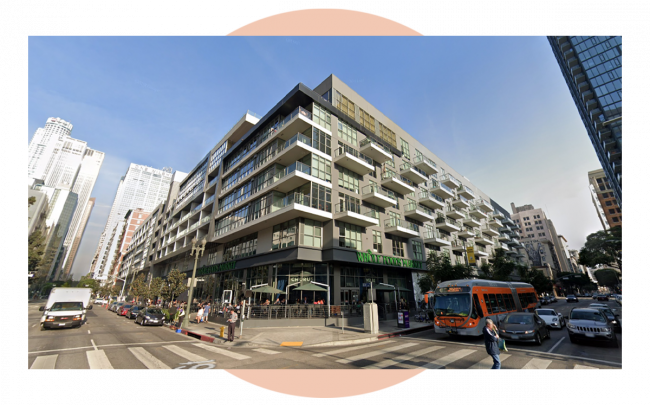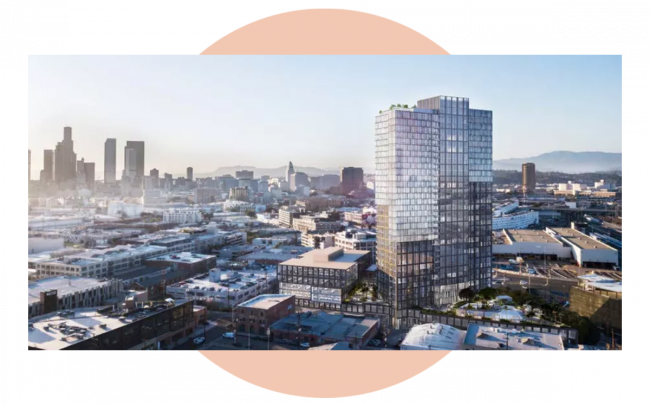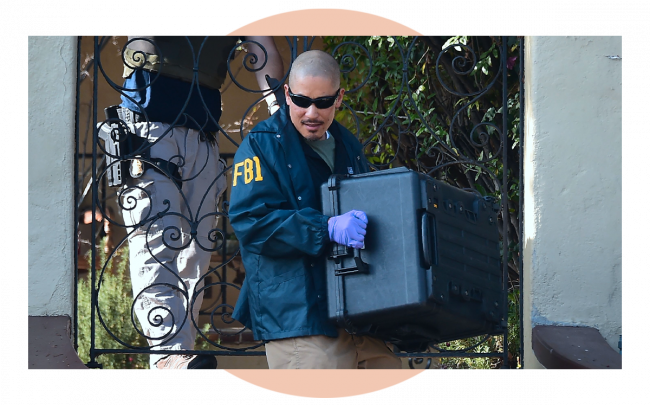Is Carmel Partners a cartoonishly nefarious developer or merely an opportunistic one caught in the wrong place at the wrong time?
The company made headlines in June for its possible role in the development-tied criminal enterprise that Los Angeles City Council member Jose Huizar allegedly ran. That audacious scheme has been called “the largest corruption scandal in recent L.A. history” by California Common Cause director Jonathan Mehta Stein.
Federal prosecutors say Carmel’s role included giving Huizar $125,000, and seeking to provide opposition research on two female Huizar staffers who had filed sexual harassment suits against the elected official.
Carmel has been an influential presence on the L.A. development scene for years, and like many other developers tackling projects in gentrifying neighborhoods, has attracted its share of foes.
“They have been screwing over communities for years with mega, market-rate projects,” said Damien Goodmon, director of the transportation and racial justice nonprofit Crenshaw Subway Coalition.
Some who have worked with Carmel, however, say the company is the target of a witch hunt.
“They were victimized by the process of dealing with Huizar, and now they are being victimized again by the ‘cancel culture’ disruption of their projects,” said one real estate attorney close to City Hall.
The developer’s future may be tied to Huizar’s, as the former councilman and DTLA kingmaker faces his criminal trial next June in federal court.
In the meantime, Carmel is still doing a lot of business in the city. The company declined to comment for this story.
To better understand Carmel’s rise and spectacular fall, The Real Deal stitched together a timeline of its major projects, milestones and controversies.
1996: Ron Zeff, a former executive at real estate investment and development firm Trammell Crow, incorporates Carmel in San Francisco. (Zeff remains the company’s CEO.)
In a world where the investment landscape may vary our integrity never will.
March 2012: Carmel announces it has raised $820 million through a real estate discretionary investment fund, Carmel Partners Investment Fund IV. The firm declares: “The fund will focus on value-add multifamily properties in supply-constrained markets with high barriers to entry.”

Neils Cotter
Carmel also names a point person for the L.A. market: Neils Cotter, formerly head of L.A. acquisitions at Matteson Companies and an ex-Air Force captain. Remember that name.
June 2012: Carmel makes its first big acquisition in the city, paying $63 million for a 130,000-square-foot site at 770 S. Grand Avenue in DTLA. It plans a residential development with 700 units, at the time a record for the neighborhood.
October 2012: To ensure one of its initial L.A. projects gets just the right roof deck permit, Carmel hires a seasoned city hall lobbyist, John Thomas “Tombo” McCarty.
From then until now, Carmel hires lobbyists on 36 different occasions, according to the city’s Ethics Commission data portal. In a 2016 lawsuit against Carmel, Friends of the Neighborhood Integrity Initiative estimates the developer spends $180,000 a year on city lobbying.

Carmel’s 770 South Grand Avenue mixed-use development, which includes a Whole Foods. (Credit: Google Maps)
November 2015: Whole Foods anchors Carmel’s 770 S. Grand Avenue project. The developer says its luxury apartments (rents for a studio start at $2,000 a month) are filling up — and filling a void in downtown.
“We think that there is a lot of demand, with a low number of high-quality apartments in the marketplace,” Dan Garibaldi, Carmel’s managing partner for development and construction, tells Downtown News.
May 2016: Carmel’s first brush with public controversy. The City Council’s Planning Land Use and Management committee — chaired by Huizar — passes the developer’s plan for a project called Cumulus, located at 2231 S. La Cienega Boulevard in West Adams.
Carmel buys the parcel for $111 million, and plans to build a 2 million-square-foot development with over 1,200 units.
But after the project receives city approval, Friends of the Neighborhood Integrity Initiative and Crenshaw Subway Coalition sue Carmel.
The groups are upset Carmel wants to build a 31-story residential tower on a block whose tallest building is four stories. Another point of contention is that Carmel doesn’t set aside units for low-income residents in a working class, Black and Latinx area.
“Cumulus demonstrates beyond any doubt the corrupting influence that developers seeking to maximize their ability to construct ever larger projects have on the city’s land use and planning process,” the lawsuit states.
But the project does receive support.
“To have a developer willing to come in, I think it’s fantastic,” Denise Edwards of the Baldwin Hills Village Garden Homeowner Association tells the Los Angeles Times.
“If it raises our property values, great. Hallelujah.”
March 2017: As the Cumulus litigation winds through the courts, Carmel pays $49 million for land at 11222 W. Pico Boulevard in Sawtelle.
The acquisition is a bet Carmel can do what the seller, Beverly Hills developer Alan Casden, could not do — overcome fierce opposition to a mixed-use development that exceeds local zoning restrictions. Carmel proposes 595 residential units and 15,000 square feet of retail. They call the development Linea.

Rendering of Carmel’s controversial 520 Mateo Street Arts District project (Credit: Department of City Planning)
Meanwhile, the developer is also drawing up the fateful 520 Mateo Street Arts District project, a 35-story tower with 475 “live/work” apartments and 105,000 square feet of retail.
Note: The above mentioned projects are the biggest Carmel L.A. developments TRD knows about. There could be other developments, because Carmel — like most developers — uses LLCs that shield its identity. And L.A. City Planning, which reviews and approves all new real estate developments, acknowledges it does not track the “true owner” of each project.

Former Carmel lobbyist Morris Goldman
Which means there could be more Carmel projects the city is now reviewing but does not know those projects belong to the developer. Said one real estate attorney: “The situation is beyond the pale.”
June 2017: Facing a lawsuit over Cumulus, possible opposition regarding Linea, and the need to get the Arts District tower approved, Carmel lobbyist Morris Goldman meets with Council member Huizar, according to a plea deal Goldman later reached with federal prosecutors. Goldman says Carmel will give $50,000 toward a political action committee whose true purpose is to raise money to help get Huizar’s wife, Richelle, elected to succeed her husband on the Council.

Richelle Huizar
September 2018: Goldman, Huizar and an unnamed company executive at Carmel commit to give another $100,000 to the Richelle Huizar PAC, and fund opposition research on two former female employees who accused Jose Huizar of sexual harassment, according to the federal indictment handed down against Huizar in June.
In exchange for the cash, Huizar would beat back opposition from organized labor, environmental groups and neighbors to the Mateo Street Arts District project. He would ensure Carmel only had to set aside 6 percent of units as affordable housing instead of the previously agreed upon 11 percent.
According to the Goldman plea agreement, potentially using union labor would have “negative repercussions for the executive personally, including the potential loss of his job.”
October 16, 2018: The moment of truth. Huizar holds a planning committee meeting where the Mateo Street project is the final item on the docket.
Members of the public speak out against the project, noting it is over 30 stories tall on a street where no buildings rise higher than four stories (sound familiar?).
“This project is egregiously out of scale with the buildings surrounding it,” testifies Kristina Kopp, an attorney for Arts District residents Steven and Carol Warren.
Carmel’s Neils Cotter — we told you to remember that name — calls the development process a “journey” and vows the site will provide “high-quality space for artists.”
Huizar and other Council members do not engage the commenters. The committee unanimously approves the project, and the full Council greenlights it two weeks later.

An FBI agent, when authorities raided L.A. Council member Jose Huizar’s home in 2018. Agents also served warrants on the councilman’s field and City Hall offices. (Credit: FREDERIC J. BROWN/AFP via Getty Images)
November 7, 2018: Federal agents raid Huizar’s home and office, investigating whether the Council member sought bribes from real estate developers. Huizar is removed a week later from all committee assignments, including Planning Committee chair.
January 9, 2019: Carmel announces a $1.28 billion multifamily fund with public pension employees the biggest investors in the fund.
April 17, 2019: A California Court of Appeals sides with Carmel in the Cumulus project, ruling the city presented enough evidence that the project was worth amending zoning and planning guidelines for.
Carmel subsequently announces an anchor tenant for Cumulus — another Whole Foods.
December 4, 2019: The City Council passes a law banning direct contributions from developers to candidates for city office.
Before the ban, Carmel provided $6,400 total to candidates running for City Council between 2013 and 2017, including $2,100 to Huizar.
The direct contributions are a small fraction of what Carmel spends on lobbying, or what it allegedly spent on the Richelle Huizar PAC.
“Under the Supreme Court Citizens United decision, the city cannot do much to regulate independent expenditures,” said Sean McMorris of Southern California Common Cause.
“Short of regulating PACs, disclosure is the cure,” McMorris said. “But it can be a shell game of moving money between LLCs on the donor and recipient side of an expenditure.”
June 16, 2020: Carmel announces pre-leasing will begin in September at the 300-unit rental at the center of Cumulus. The units feature “built-in wet bars, full-height wine refrigerators” and an “ultra-modern vibe,” according to Carmel’s press release.
Linea also begins residential and retail leasing.
June 23, 2020: The FBI arrests Jose Huizar at his Boyle Heights home. The indictment released in tandem with the arrest is the first implication of Carmel in the Huizar probe.
July 2, 2020: Carmel releases a statement: “The members of the executive and management committees of Carmel Partners did not knowingly participate in any pay-to-play scheme outlined in the U.S. Attorney’s charges against Mr. Huizar.” The statement notes though that the firm “placed the Carmel executive mentioned in the complaint on administrative leave. There are a number of concerning allegations that require investigation.”
Carmel has declined to name the executive.
But an email left with Cotter bounced back with the message he is on leave, and Cotter’s listed company phone number is disconnected.

L.A. City Attorney Mike Feuer
August 6, 2020: City Attorney Mike Feuer proposes an ordinance empowering the City Council to rescind approvals on projects when evidence later comes to light of corruption. Nixing a project previously approved would require a two-thirds Council vote.
The City Council also places a “hold” on the Mateo Street project. The decision comes after federal prosecutors announce a plea deal with Morris Goldman, the Carmel lobbyist, on one count of felony bribery.
August 18, 2020: Residents of Los Feliz file an appeal with the City Planning Commission. It is over Carmel’s latest project: a proposed eight-story, 153-unit residential complex at 4649 Maubert Avenue that the Planning Commission approved Aug. 12.
“The proposed project – with a smidgen of affordable housing units, and a height that would exceed anything in the surrounding area — isn’t designated for the benefit of our community, but is being used to mine the city for profitable land-use entitlements,” the appeal states.
“The applicant for the project, Carmel Partners, has been identified as part of the bribery scandal involving members of the City Council,” the appeal goes on to note. “This fact alone should have put any approvals on permanent hold.”
